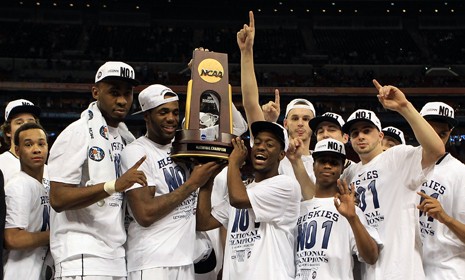The NCAA's 'sweeping reform' of college sports
New standards for recruiting, player compensation, and academics are unveiled after years of corruption and exploitation allegations

A free daily email with the biggest news stories of the day – and the best features from TheWeek.com
You are now subscribed
Your newsletter sign-up was successful
One month after Taylor Branch's damning cover story in The Atlantic about the NCAA's shameful exploitation of college athletes — which itself followed a raft of accusations of bribery and foul play — the organization that governs college sports announced "sweeping reform" this week. Changes include adding a stipend to athletic scholarship packages, holding athletes to more rigorous academic standards, and restructuring the summer recruiting model. Here's what you should know:
How are scholarships changing?
Schools can now offer players $2,000 of additional spending money along with the scholarships covering tuition, room, and board that many student athletes already receive. The $2,000 stipend is comparable to what students with non-athletic scholarships are able to earn, but which the NCAA has banned since 1972. "Some thought the total amount should have been higher," says Michael Marot for the Associated Press, as studies show that the average athlete pays $3,000 to $4,000 out of pocket to cover the cost of college. Still, the measure is a long time coming, says David Cassilo at The Daily Caller. Some NCAA conferences rake in more than $150 million in revenue from broadcast rights each year. The players deserve "a piece of the financial pie."
The Week
Escape your echo chamber. Get the facts behind the news, plus analysis from multiple perspectives.

Sign up for The Week's Free Newsletters
From our morning news briefing to a weekly Good News Newsletter, get the best of The Week delivered directly to your inbox.
From our morning news briefing to a weekly Good News Newsletter, get the best of The Week delivered directly to your inbox.
Are there other perks for players?
Currently, scholarships must be renewed annually, "which essentially allows coaches to fire once-recruited, now-unwanted college athletes" based on poor athletic performance or the arrival of a shiny new recruit, says Patrick Hruby at The Atlantic. So "the most important change of all," says Jason Kirk at SB Nation, is the measure allowing schools to award scholarships that are guaranteed for multiple years — and possibly for a player's entire college career.
What about academic standards?
In order to qualify for the postseason, a team must collectively meet an academic standard called the Academic Progress Rate (APR) — a figure based on the academic performance of the players. The new regulations aim to increase that standard over the next four years, says Curtis Eichelberger at Bloomberg, beginning with a 900 APR requirement and rising to 930 — equivalent to a 50 percent graduation rate — by 2015. According to that benchmark, the University of Connecticut's men's basketball team, which won the national championship last season, would not have been eligible for postseason play, because its APR of 893.
A free daily email with the biggest news stories of the day – and the best features from TheWeek.com
Are there new recruiting restrictions?
Coaches will be allowed send text messages to prospective student athletes, and offer paid visits to high school recruits starting in prospects' junior year, says Josh Barr at The Washington Post. Coaches can also evaluate a recruit's abilities during that visit, which was previously barred. Recruiting will also now be allowed during two weekends in April, in addition to the already-designated time in July. The idea is that this will create "better coach-recruit relationships," while reducing the "influence of third parties, such as runners and street agents," who had been corrupting the recruitment process.
What are the criticisms of these reforms?
These are small reforms that don't tackle the NCAA's biggest problem, says Hruby. Student athletes are forced to retain amateur status, but college sports are a "professional, commercial enterprise" that profit off of students' performances. It may be time to adopt the Olympic approach, and let "athletes earn what they can." And not all the changes are necessarily good, either, says Gwen Knapp at The San Francisco Chronicle. The $2,000 stipend will increase the gap between rich schools and smaller programs struggling to compete. The stipend is, after all, voluntary, and must be funded by the college itself — something that small schools won't be able to afford. They will end up "priced out" when recruiting new players.
Sources: AP, Atlantic, Bloomberg, Daily Caller, San Francisco Chronicle, SB Nation, Wash. Post